The Roma Nova thrillers are definitely unusual. Although part of the historical fiction canon, alternate history stories ask readers to follow a speculative but hopefully historically logical path. In a way they are niche, but one which I hope will grow.
Some periods are fashionable like the Tudors, others eternally loved like Regency, others wax and wane in popularity such as the Second World War, or (dare I say) Greek and Roman. But some are relatively unexplored and contain treasure waiting to be discovered.
 Unusual Historicals sets out to highlight these hidden pearls and diamonds. A group of historical author-bloggers established in 2006 explore unusual and until now hidden settings and times to create distinctive, intriguing novels on the edge of historical fiction. Unusual Historicals sets out to highlight these hidden pearls and diamonds. A group of historical author-bloggers established in 2006 explore unusual and until now hidden settings and times to create distinctive, intriguing novels on the edge of historical fiction.
And I’ve just been invited to join this august group! 🙂
Posts are clustered round themes, and the fifteen regular contributors provide four or five posts each month throughout during the year. In 2016, you’ll see these:
January: New Year Traditions
February: Unlikely Romances
March: First Ladies
April: The Intellectuals
May: My Characters Lived In ….
June: Slaves and Servants
July: Beyond Our Stars
August: The Arts
September: Revolutions
October: Treasure
November: Odd Jobs
December: Imagining the End
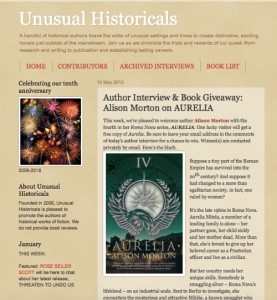 And interspersed are posts from visitors with extracts from their new books, plus author interviews. All the Roma Nova novels have been featured, so I know about the friendliness and the scope of the site. And interspersed are posts from visitors with extracts from their new books, plus author interviews. All the Roma Nova novels have been featured, so I know about the friendliness and the scope of the site.
Group blogging is beneficial for writers and readers.
Writers can share research, insights and photos related to their period as well as have the discipline of commitment to produce regular pieces of work apart from their own books.
Readers discover new authors and fascinating facts about clothes, manners, food, architecture and all aspects of daily life in the past from a select but knowledgeable group of historical authors. Win-win!
‘Eclectic mix’ is the expression designed for this site – all unusual and definitely historical. Do go and have a look and if you like what you see, follow us. It’ll be a great ride!
Alison Morton is the author of Roma Nova thrillers, INCEPTIO, PERFIDITAS, SUCCESSIO and AURELIA. The Roma Nova box set is available only until 31 January 2016.
Find out more about Roma Nova, its origins, stories and heroines…
If you enjoyed this post, do share it with your friends!Like this:Like Loading...
 I’ve published 12 books – seven novels, two novellas, a short story collection and two non-fiction (as at 2021) – via the indie route since 2012, but in the preceding three years I learnt how to write for publication. More importantly, I learnt writing techniques: structure, plot, dialogue; how to delete adverbs, adjectives and over-writing; the techniques needed in the publishing world – proposals, submission packages, approach letters and etiquette in approaching agents and publishers; how the publishing industry worked, who was who and how to make and use opportunities. I’ve attended conferences, courses, fairs, seminars, I read how-to books, joined writers’ groups and associations and talked to other writers, tutors, assessors, publishing experts and mentors. I brought in my business skills: time management, networking, project management, accounting, cost analysis, pricing, marketing, PR and negotiating. And I listened. I’ve published 12 books – seven novels, two novellas, a short story collection and two non-fiction (as at 2021) – via the indie route since 2012, but in the preceding three years I learnt how to write for publication. More importantly, I learnt writing techniques: structure, plot, dialogue; how to delete adverbs, adjectives and over-writing; the techniques needed in the publishing world – proposals, submission packages, approach letters and etiquette in approaching agents and publishers; how the publishing industry worked, who was who and how to make and use opportunities. I’ve attended conferences, courses, fairs, seminars, I read how-to books, joined writers’ groups and associations and talked to other writers, tutors, assessors, publishing experts and mentors. I brought in my business skills: time management, networking, project management, accounting, cost analysis, pricing, marketing, PR and negotiating. And I listened.
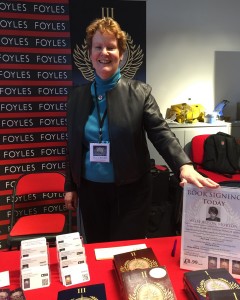
Now I’m not some Mary Sue in whose lap Fortuna spilt luck and prosperity. I worked for it all. But along the way, I learnt a great deal including some essential dos and don’ts.
Contrary to the jolly cheerleader ‘you can have it all’ approach, I’m going to be negative, and possibly crushing, because there are a lot of things you shouldn’t do if you want to succeed as an indie author.
Here are five cautions you might like to consider:
1. You are not entitled to inflict rubbish on readers just because you can
In this glorious age of democratisation of publishing – the sheer accessibility of digital and print on demand technologies is exhilarating – anybody can publish a book. Being honest, at least 80% of them shouldn’t.
Grammar, punctuation, gripping prose, a rattling good story edited by a competent experienced editor and a fabulous book jacket are minima. If you DIY publish and many do, learn how to do it properly: read ‘how to’ books, go on courses, research online and read guides, join specialist forums, learn from the experts. Doing anything else is lazy or arrogant.
2. Don’t whinge
The world is unfair. You learnt that in the playground. If you have a plan, work hard, research thoroughly and cultivate people, you will increase your chances of success astronomically.
You will see others get breaks, seem to prosper, receive plaudits, win prizes. Admit it, you’re left feeling resentful and envious. A secret – they’ve been in the exact same place, but slogged on. If you need to whinge, talk to the cat/dog/your critique partner. But don’t do it in public or you’ll be seen as needy. And nobody likes to be seen supporting a needy whinger…
3. Don’t diss others in the food chain
This is a life thing and applies even more to writing and publishing; it’s a village. Be friendly to all whether they’re a stellar bestseller or the newbie in your writing group. Of course, there are people we don’t warm to – the bumptious, the snobby, the unctuous and the darnright obnoxious. They have their own problems and really, we have to feel sorry for them.
As an indie, you have the benefits of freedom, control and the ability to be fully flexible in your PR and marketing. But please don’t sneer at mainstream authors or regard them as ‘sold out.’ They have chosen their way as you have yours. Remember you are all writers, especially if you share a genre.
4. Don’t be a pest
It’s hard, really hard, when you’re clutching your sweated-over manuscript or self-published book to your chest and you see your dream publisher/agent/endorser twenty paces from you not to rush over and gabble about your treasure in a demented über-pitch. This was one agent’s experience.
Now, nobody is more passionate about your book than you and that’s how it should be; you have immersed long hours in it and probably part of your soul. But rein it back and think strategically. Approach people in the terms they find acceptable, be gradual, wear your sensible hat and exert your brain, not your emotions. Publishers and agents outline their requirements on their websites – easy. Endorsers and reviewers, slightly trickier, are often very busy and/or fighting deadlines. Approach politely and if they don’t have time or don’t wish to read your book, thank them and withdraw gracefully. Ditto if you decide to approach agents and publishers and your book is rejected. And please don’t send unreadable files (silly fonts, midget type, badly formatted) to anybody at any stage.
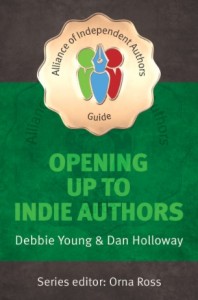 Once your book is published, bookshops and libraries are not obliged to stock it. See the Alliance of Independent Authors’ very sensible guide on how to succeed in this. Once your book is published, bookshops and libraries are not obliged to stock it. See the Alliance of Independent Authors’ very sensible guide on how to succeed in this.
Amazon UK Amazon US Kobo
5. Don’t expect to be the great breakthrough author, nor to be rich beyond dreams
More books = more income, but in the ferociously competitive book world, you’re statistically unlikely to become one of the ‘big beasts’. However, with hard work (that expression again), you can enjoy a supplementary, even comfortable income. And as you mature as a writer, people will ask for your opinion, read your blog, ask you to speak and, as long as you produce good content and information, come to regard you as an expert in your field. You may not win the Booker Prize, but you’ll probably be eligible for, and even win, some well-regarded indie ones.
Harsh? Probably. Realistic, certainly.
But being a writer, although creative, is a job. As an indie writer, you just have to show you’re also a professional.
Updated 2021: Alison Morton is the author of Roma Nova thrillers – INCEPTIO, CARINA (novella), PERFIDITAS, SUCCESSIO, AURELIA, NEXUS (novella), INSURRECTIO and RETALIO, and ROMA NOVA EXTRA, a collection of short stories. Audiobooks are available for four of the series.
Find out more about Roma Nova, its origins, stories and heroines and taste the latest contemporary thriller… Download ‘Welcome to Alison Morton’s Thriller Worlds’, a FREE eBook, as a thank you gift when you sign up to Alison’s monthly email newsletter. You’ll also be among the first to know about news and book progress before everybody else, and take part in giveaways.
If you enjoyed this post, do share it with your friends!Like this:Like Loading...
 Today, I’m welcoming fellow Romantic Novelists’ Association member Joanna Maitland to talk about naming characters. Today, I’m welcoming fellow Romantic Novelists’ Association member Joanna Maitland to talk about naming characters.
After many years publishing Regencies with Harlequin Mills & Boon, Joanna is branching out into new fields as an independent author. With fellow author Sophie Weston, Joanna has just set up Libertà! where readers and writers can meet and share enthusiasms. Joanna hopes to welcome fans, old and new, and readers of all sorts of fiction to the website.
Joanna’s latest Regency ebook novella, His Silken Seduction, takes readers to pre-Waterloo France and the excitement of Napoleon’s Hundred Days. Her second, coming early in 2016, will be a timeslip, Lady In Lace. You can find all her books at http://LibertaBooks.com/joanna
Over to Joanna!
 Authors have different ways of naming characters. Some label their key characters hero and heroine until they have finished the first draft, others need names for their characters before they write a word. Authors have different ways of naming characters. Some label their key characters hero and heroine until they have finished the first draft, others need names for their characters before they write a word.
Names, for me, are integral to character. Names can even be part of the plot. In my early novel, My Lady Angel, the hero had two names – Frederick, the name used by the father he detested, and Max, the name by which his friends knew him. The difference between the two names, and the personalities that lay behind them, was a crucial thread of the story.
Sometimes, choosing a name doesn’t go particularly well. When I was working on A Regency Invitation, a three-novella joint story with Nicola Cornick and Elizabeth Rolls, I initially called my hero Will. But he hated it. His real name turned out to be Marcus and, once I’d changed it, he happily strode onto the stage and started talking. How did I know that his name was Marcus? I’m not sure. It just bubbled up from my subconscious. And I knew it was right immediately.
 All this may suggest that naming characters is a sort of alchemy, a half-magical process where the author negotiates with her characters as if they were real. It can feel like that, I’ll admit, but there’s also quite a lot of routine involved. All this may suggest that naming characters is a sort of alchemy, a half-magical process where the author negotiates with her characters as if they were real. It can feel like that, I’ll admit, but there’s also quite a lot of routine involved.
I have simple rules:
- make sure all characters’ names start with a different initial so there’s no chance that the reader will mix them up;
- try to have first names of different numbers of syllables, especially for hero and heroine – go for Elizabeth and Tom, say, rather than Elizabeth and Christopher;
- if possible, avoid names that end in -s or -es, like Bess, because the possessive can tie you in knots like “Bess’s best besom” (I broke my own rule with Marcus, I admit, but he insisted!)
- make sure characters’ names are appropriate for the period of the novel, whether it’s historical or contemporary; the name has to have been in use/in vogue at the time the character was born.
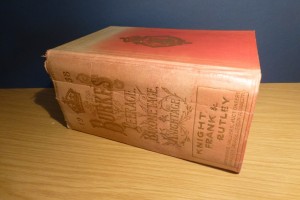 One trick is to check the names that real people of the time were using. You can find them in parish registers, contemporary letters and diaries, newspapers and so on. I tend to rely on my battered old copy of Burke’s Peerage (vintage 1938) where I borrow first names from real people. One trick is to check the names that real people of the time were using. You can find them in parish registers, contemporary letters and diaries, newspapers and so on. I tend to rely on my battered old copy of Burke’s Peerage (vintage 1938) where I borrow first names from real people.
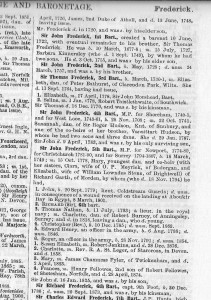 There’s part of a random page shown here, for the Frederick family. If you can read the tiny print (click the photo for a larger version), you’ll see that John, the heir to the 5th Baronet, died of wounds received at Aboukir Bay, Egypt, in 1801. Burke’s is full of such fascinating and thought-provoking details. There’s part of a random page shown here, for the Frederick family. If you can read the tiny print (click the photo for a larger version), you’ll see that John, the heir to the 5th Baronet, died of wounds received at Aboukir Bay, Egypt, in 1801. Burke’s is full of such fascinating and thought-provoking details.
It can be wise to avoid actual names, especially if you write contemporary stories. Real people do sue! Georgette Heyer use to pore over maps to find obscure place names for her characters. Fownhope (possibly the inspiration for Augustus Fawnhope in The Grand Sophy) is a Herefordshire village, for example. I regularly note down interesting place names from road signs. And you can always modify names, as Heyer did, turning them into something that never existed.
 A Warning! If you decide to change Will to Marcus, say, do beware of unintended consequences of Search/Replace. Your beautiful proposal scene, for example, might become something quite odd: A Warning! If you decide to change Will to Marcus, say, do beware of unintended consequences of Search/Replace. Your beautiful proposal scene, for example, might become something quite odd:
Hero (on bended knee) to heroine: I love you, darling. Marcus you marry me?
Heroine (overcome with joy): Oh, yes! Yes, of course I marcus.
We wish Joanna every success with Libertà!, her new joint venture with fellow author Sophie Weston.

Connect with Joanna:
Website: http://LibertaBooks.com
Blog: http://LibertaBooks.com/blog
Twitter: @LibertaBooks @joannamaitland @sophiewestonbks
Joanna Maitland’s latest Regency ebook novella, His Silken Seduction, takes readers to pre-Waterloo France and the excitement of Napoleon’s Hundred Days. Available now on Kindle

Wounded. Abandoned.
In the enemy’s bed.
He’s Wellington’s spy, surviving in war-torn France.
His silk-weaver’s touch is driving him wild.
But she’s the enemy.
Dare he trust her with his life?
Or his heart?
Alison Morton is the author of Roma Nova thrillers, INCEPTIO, PERFIDITAS and SUCCESSIO. The fourth book, AURELIA and the Roma Nova box set are now out.
Find out more about Roma Nova, its origins, stories and heroines…
If you enjoyed this post, do share it with your friends!Like this:Like Loading...
 Today, in this last ‘Ravens’ post I’m welcoming Ruth Downie, author and good friend of Roma Nova. We met in August 2013 on The Wonder of Rome blog hop (her post intriguingly called ‘First drown your ape’) and she enlightened us more about Roman medical practice in October 2014 in this post about historical truth and donkey poo. Ruth was also kind enough to endorse AURELIA. Today, in this last ‘Ravens’ post I’m welcoming Ruth Downie, author and good friend of Roma Nova. We met in August 2013 on The Wonder of Rome blog hop (her post intriguingly called ‘First drown your ape’) and she enlightened us more about Roman medical practice in October 2014 in this post about historical truth and donkey poo. Ruth was also kind enough to endorse AURELIA.
Ruth read too much Jane Austen at university, emerged with an English degree and a plan to get married and live happily ever after. She says she’s still working on it. She won the Fay Weldon section of the BBC’s End of Story competition in 2004. The first book in her crime series featuring Roman Army medic Ruso was a New York Times bestseller under the title ‘Medicus’. It was published as ‘Ruso and the Disappearing Dancing Girls,’ in the UK, where The Times recommended it as one of their ‘Seven best thrillers for Christmas’. The sixth in the series, ‘Tabula Rasa,’ came out in 2014. Ruth is currently working on the next book and also spends several weeks every summer wielding an archaeological trowel in search of inspiration.
Ruth has made grumpy, tough, but kind-hearted Ruso such a real character I’m surprised he isn’t listed in the Roman army rolls! I can’t wait for the next in the Ruso series (no pressure, Ruth), but in the meantime, she’s been collaborating with six other authors – E. (Eliza) Knight, Russell Whitfield, Kate Quinn, Stephanie Dray, S.J.A.Turney and Vicky Alvear Shecter – to produce seven stories set during Boudica’s revolt in Britain 60/61 AD.
Britannia: land of mist and magic clinging to the western edge of the Roman Empire. A red-haired queen named Boudica led her people in a desperate rebellion against the might of Rome, an epic struggle destined to consume heroes and cowards, young and old, Roman and Briton. A Year of Ravens is a novel in seven parts, overlapping stories of warriors and peacemakers, queens and slaves, Romans and Britons who cross paths during Boudica’s epic rebellion. But who will survive to see the dawn of a new Britannia, and who will fall to feed the ravens?
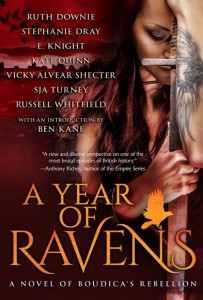 First of all, I have to say how much I enjoyed A Year of Ravens. These are not just weasel words – it’s a five star book, no question. Congratulations to Ruth on Ria’s story; it was very poignant and I enjoyed the view ‘from below’. I rather think she made the best king’s daughter of them all… First of all, I have to say how much I enjoyed A Year of Ravens. These are not just weasel words – it’s a five star book, no question. Congratulations to Ruth on Ria’s story; it was very poignant and I enjoyed the view ‘from below’. I rather think she made the best king’s daughter of them all…
As with others in this series of interviews, I asked Ruth some pertinent (possibly impertinent) questions about this project…
Why does Boudicca have an enduring attraction?
As a Briton myself it’s tempting to fall back on the cliché that we all love a heroic failure, but I think it’s deeper than that. Deeper, too, than just respect for a brave woman. Underlying Boudica’s story is a question that’s still relevant today: What do you do in the face of tyranny? Could she have made different choices? The extra lure for writers, I think, is that we only know about her through the words of her conquerors. There must have been another version of events, and that leaves a huge space for the imagination.
Were the group of authors self-selected or chosen? And how did you find working together?
I was invited to fill a gap in the group, and have only ‘met’ the other writers via the Internet – which I have to admit feels a bit weird, since our characters know each other very well indeed. Luckily, the core group had already figured out how to coordinate everything during their first book, and everyone was very welcoming, so it wasn’t hard to slot in. As the project’s gone along I’ve grown increasingly in awe of the skills the rest of the team have to offer – not just writing and editing, which you might expect, but all the other jobs that need to be done to get a book out there. Every time something came up, somebody turned out either to know how to do it or to know somebody who did. Real professionals!
What do you think is in it for the reader having such a diversity of author styles?
I’m hoping readers will get the best of all of us. For example, I’m fascinated by the question of how ordinary Britons would have survived under the constant pressure of the Roman occupation, but I wouldn’t have a clue how to write a big battle scene. Fortunately there are people in the team who are brilliant at them, as readers will find out.
Will there be another book focusing on a different event?
I guess that’ll depend on the people who read this one…
Publication date was 17 November and you can order A Year of Ravens from Amazon UK and Amazon US now.
Ruth very kindly hosted the Roma Nova box set on her blog. Read more about her Ruso series on her website.
Alison Morton is the author of Roma Nova thrillers, INCEPTIO, PERFIDITAS and SUCCESSIO. The fourth book, AURELIA and the Roma Nova box set are now out.
Find out more about Roma Nova, its origins, stories and heroines…
If you enjoyed this post, do share it with your friends!Like this:Like Loading...
 This week’s ‘Ravens’ guest is S J A Turney, author of the well-reviewed Roman legionary series, Marius’ Mules, The Ottoman Cycle and the Interregnum trilogy. His new series The Great Game, begins with Praetorian, published in March 2015. Simon combines a love of travel and history with that of architecture and writing. Since leaving school and University, he’s tried car sales, insurance, software engineering, computer network management, civil service and even painting and decorating! In 2003 he wrote his first full length novel which started Marius’ Mules. Two years later came Interregnum, a fantasy story with a heavy flavour of Rome. Now there are eight Marius Mules and three in the Interregnum series… This week’s ‘Ravens’ guest is S J A Turney, author of the well-reviewed Roman legionary series, Marius’ Mules, The Ottoman Cycle and the Interregnum trilogy. His new series The Great Game, begins with Praetorian, published in March 2015. Simon combines a love of travel and history with that of architecture and writing. Since leaving school and University, he’s tried car sales, insurance, software engineering, computer network management, civil service and even painting and decorating! In 2003 he wrote his first full length novel which started Marius’ Mules. Two years later came Interregnum, a fantasy story with a heavy flavour of Rome. Now there are eight Marius Mules and three in the Interregnum series…
But, of course, his latest work was the collaborative A Year of Ravens written with E. (Eliza) Knight, Ruth Downie, Russell Whitfield, Kate Quinn, Stephanie Dray and Vicky Alvear Shecter – seven stories set during Boudica’s revolt in Britain 60/61 AD.
Britannia: land of mist and magic clinging to the western edge of the Roman Empire. A red-haired queen named Boudica led her people in a desperate rebellion against the might of Rome, an epic struggle destined to consume heroes and cowards, young and old, Roman and Briton. A Year of Ravens is a novel in seven parts, overlapping stories of warriors and peacemakers, queens and slaves, Romans and Britons who cross paths during Boudica’s epic rebellion. But who will survive to see the dawn of a new Britannia, and who will fall to feed the ravens?
 ‘Ravens’ came out just over two weeks ago and is going like a hot cake. I suggest you buy it. (Amazon UK, Amazon US) ‘Ravens’ came out just over two weeks ago and is going like a hot cake. I suggest you buy it. (Amazon UK, Amazon US)
Simon tells the story of Andecarus, the son of a Celtic war leader, who has been fostered by the family of a high Roman official since childhood. It was very much part of the Roman/client ruler relationship that the latter’s children were ‘guests’ of Rome, not just to ensure the former’s compliance but to make the next generation of local rulers fully conversant with and embrace the Roman way.
Andecarus is such a sympathetic character. His dilemma as a child of two cultures resonates with me. Karen Brown/Carina Mitela experiences similar conflicts, although she makes her decision earlier in her story, although in PERFIDITAS she feels a different dual-pull. Andecarus really does go through the mill in two of the toughest and uncompromising cultures around. But eventually, in the midst of war and rebellion, he has to make a choice.
So here are Simon’s answers to my series questions…
Why does Boudicca have an enduring attraction?
Boudica stands out in many ways. She is a warrior woman in an almost Amazonian mould in an era when most of our historical figures of note are male, especially in the fields of warfare and politics. She is the underdog, and everyone loves the underdog. She and her Iceni and Trinovante warriors may have been numerous and strong, but counted against the fearsome Roman war machine, which could draw on resources of men and equipment that might have seemed almost infinite at the time, they were always going to be the underdog. And tied into that is the fact that any text you read on her, you know the end is brutal and bitter, so there is a grisly fascination in seeing how it comes about.
And then there is the nationalist aspect. You don’t have to be English, or even British to appreciate Boudica, who shares a place of national pride with figures like Arminius, Vercingetorix and Don Diego de Vivar (El Cid). She represents a final stand of an ancient, chaotic world against a more organized, more modern, more practical one. And, of course, she is a figurehead for all the Celtic peoples. To see how she lives on in the national consciousness, one only needs to look at the statue of her in London. She ticks a box on almost everyone’s wishlist in a heroine.
How did you find working together as a group of authors?
I have thoroughly enjoyed the collaboration. I’ve worked on collaborative efforts before, but only ever with one other writer, and it has been fascinating to see how well a truly deep and complex tale can evolve from the cross-pollination of ideas from seven different authors. At times it can be a little frustrating as several views conflict and need compex resolution, but when that resolution happens and you look back, you can see the improvement in the work that has been born from the discussion. In fact, there has been very little conflict over the book – surprisingly so to my mind.
I kick myself to some extent that, being given what could have been a straightforward section of the story to tell, I expanded the character to the point where he became involved in nearly every part of the overall story, making my part more complex than it should have been, but my co-authors took the character of Andecarus and ran with it, growing and deepening it beyond my wildest dreams, and the result, yet again, is far greater than anything I could have accomplished alone. And that, I think, is part of the joy of working on this, and will be part of the joy of reading it: the inter-connection between the characters, threads and stories that weave in and out create a depth that no single author would achieve. I would say that out of chaos is born a gem, but to be honest, even at the points when I felt my part was becoming chaotic, my co-authors were keeping everything together. Would I do it again? Hell, yes.
What do you think is in it for the reader having such a diversity of author styles?
Oops. Think I might have partially answered this already. The fact is that each author in this work has not only their own writing style, but their own ethos and very individual personality, and it is those that I feel shine through most in the work. With each very different mind-set, each tale has been focused slightly differently and, since they are all based around separate characters, that works well, for the idiosyncrasies and biases of that writer become part of the character. For example, I am a writer of Roman fiction, here telling the tale of a native, albeit a Roman-influenced one. Thus in my tale there are echoes of mighty Rome hovering in the wings at all time. I can’t prevent that. It’s part of me. But it has therefore become part of Andecarus and part of his journey.
Similarly, each writer brings individuality to the story and the character far beyond the writing style. And yet, because of the nature of the collaboration and the cross-pollination of ideas I mentioned earlier, those very separate themes and characters have been tied together in an intricate yet strong web. The reader here is being treated to a single story – one of the most important uprisings in either British or Roman history, but he or she is also being given the opportunity to see it through seven very different perspectives, and that to a great extent removes the bias you would naturally get with one viewpoint.
Will there be another book focusing on a different event?
I am positive there will be another. Whether or not I am one of the lucky few who get to contribute will depend upon a great number of different factors, such as workload, availability of contributors, whether or not the subject matter is suitable. For me, if the theme is right, I would love nothing more than to work on another book with this fine bunch (and maybe some of those I missed from The Day of Fire, too.) I would love to explore a few different eras and milieu. It may be a touchy subject, but Roman Judea and the Biblical epic is a fascinating subject. The fall of Jerusalem and the siege of Masada too appeal. The great fire of London has possibilities, as well as reconquista of Spain. There are so many stories waiting to be told, some of which would be vastly improved by being given this sort of treatment that I can only see the H Team’s work having only just begun…
Thank you, Simon!
Publication date was 17 November and you can order from Amazon UK and Amazon US now.
Simon very kindly hosted the Roma Nova box set on his blog and reviewed INCEPTIO – do pop over and read them!
Alison Morton is the author of Roma Nova thrillers, INCEPTIO, PERFIDITAS and SUCCESSIO. The fourth book, AURELIA and the Roma Nova box set are now out.
Find out more about Roma Nova, its origins, stories and heroines…
If you enjoyed this post, do share it with your friends!Like this:Like Loading...
|
Subscribe to Blog via Email
Join 50 other subscribers.
Categories
Archive
|
 Unusual Historicals sets out to highlight these hidden pearls and diamonds. A group of historical author-bloggers established in 2006 explore unusual and until now hidden settings and times to create distinctive, intriguing novels on the edge of historical fiction.
Unusual Historicals sets out to highlight these hidden pearls and diamonds. A group of historical author-bloggers established in 2006 explore unusual and until now hidden settings and times to create distinctive, intriguing novels on the edge of historical fiction. And interspersed are posts from visitors with extracts from their new books, plus author interviews. All the Roma Nova novels have been featured, so I know about the friendliness and the scope of the site.
And interspersed are posts from visitors with extracts from their new books, plus author interviews. All the Roma Nova novels have been featured, so I know about the friendliness and the scope of the site.























